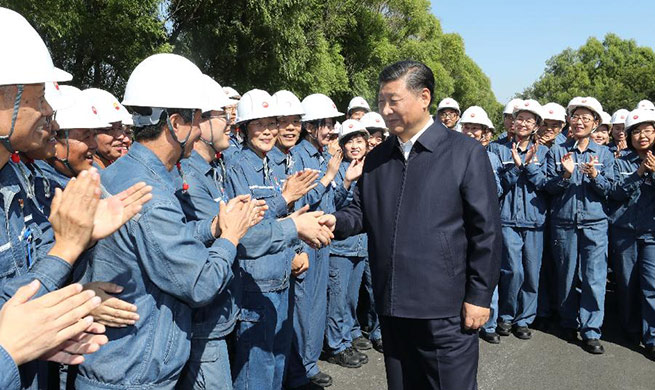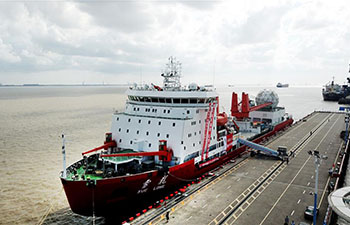by Stefania Fumo
ROME, Sept. 27 (Xinhua) -- Italy's new rightwing-populist government grappled with its first economic planning document (DEF) on Thursday after recent estimates of the country's economic growth for this year and the next were revised downward.
Every year in the fall, the Italian government issues a DEF, which is a macroeconomic blueprint containing the macroeconomic assumptions underlying the policies in its next budget bill.
The current government, which took office in June, promised citizens it would cut taxes, introduce a universal basic income, and roll back unpopular pension reforms.
According to ISTAT national statistics agency, Italy's gross domestic product (GDP) amounted to 1.7 trillion euros in 2017, up 1.6 percent over the previous year.
However, according to the Bank of Italy, the country's public debt stood at 2.3 trillion euros in July 2018.
This means that Italy owes far more than it produces, and therefore it lives on borrowed money -- a fact that policymakers must deal with if they want to finance their pledges without driving the country into an economic tailspin.
Also in July, the Bank of Italy revised downward its GDP growth estimates for this year from 1.4 percent to 1.3 percent and from 1.2 percent to 1 percent for 2019.
In a July economic forecast for Italy, the European Commission said real GDP is expected to grow by 1.3 percent in 2018 before easing down to 1.1 percent in 2019, "based on a no-policy-change assumption".
On Sept. 20, the Paris-based Organisation for Economic Co-operation and Development (OECD) revised downward its 2018 GDP growth estimates for Italy, from 1.4 percent to 1.2 percent. It left 2019 growth estimates unchanged at 1.1 percent.
The OECD cited uncertainty on policy choices, rising interest rates and slower job creation as reasons why growth could slow down.
In its Global Economic Outlook (GEO) published on Sept. 21, Fitch ratings agency said that "the Italian economy expanded by 0.2 percent in the second quarter of 2018, half the pace we forecast at the time of the June GEO."
It said growth could be hampered by "the uncertainty created by the ongoing trade disputes, domestic political concerns and the budgetary backdrop".
"It remains to be seen how much of the deal agreed by the coalition is implemented," Fitch analysts wrote, adding that "the government has sent conflicting messages about its fiscal agenda".
Fitch went on to forecast full-year growth of 1.2 percent in 2018 and 2019, compared with 1.5 percent in 2017, partly due to greater domestic policy uncertainty.
Most recently on Sept. 26, Standard & Poor's ratings agency also revised downward its GDP growth forecast for Italy, from 1.3 percent to 1.1 percent this year and from 1.2 percent to 1.1 percent in 2019.
It remains to be seen whether Italian government will find ways to implement its programs without losing the credibility it needs in order to keep borrowing money.













